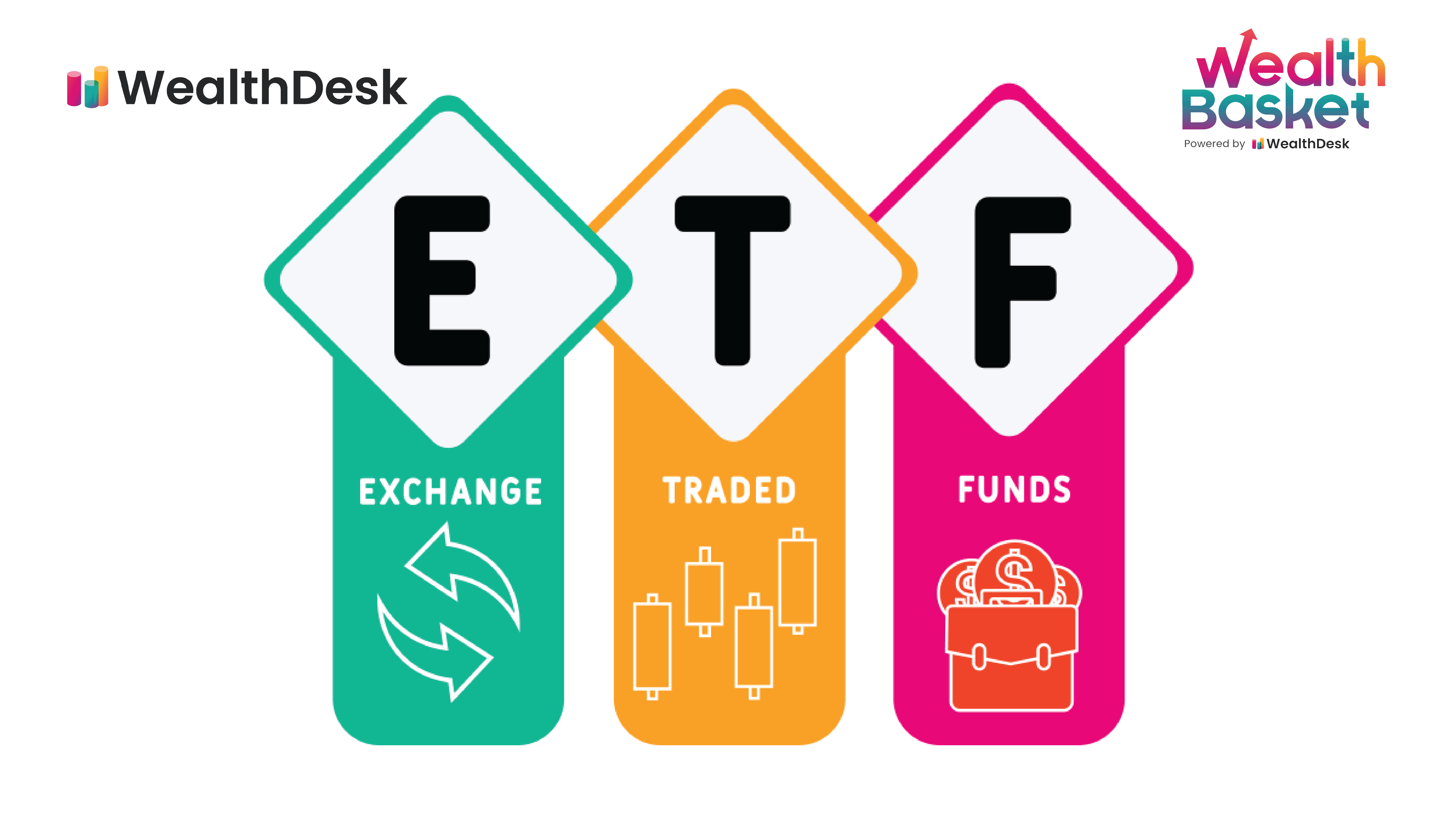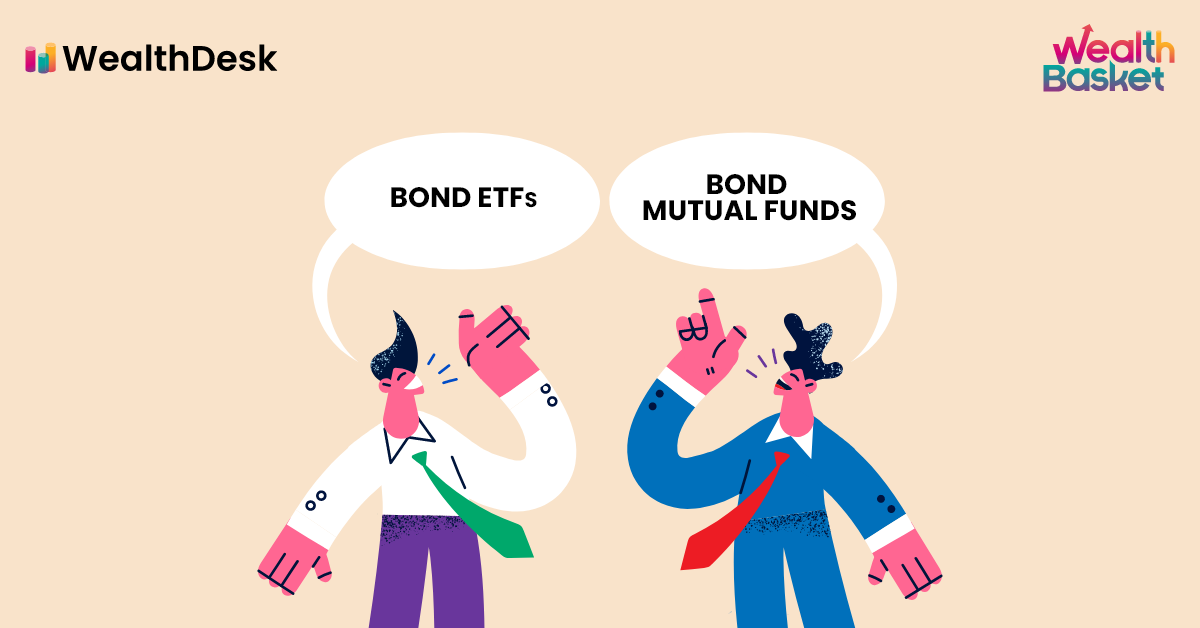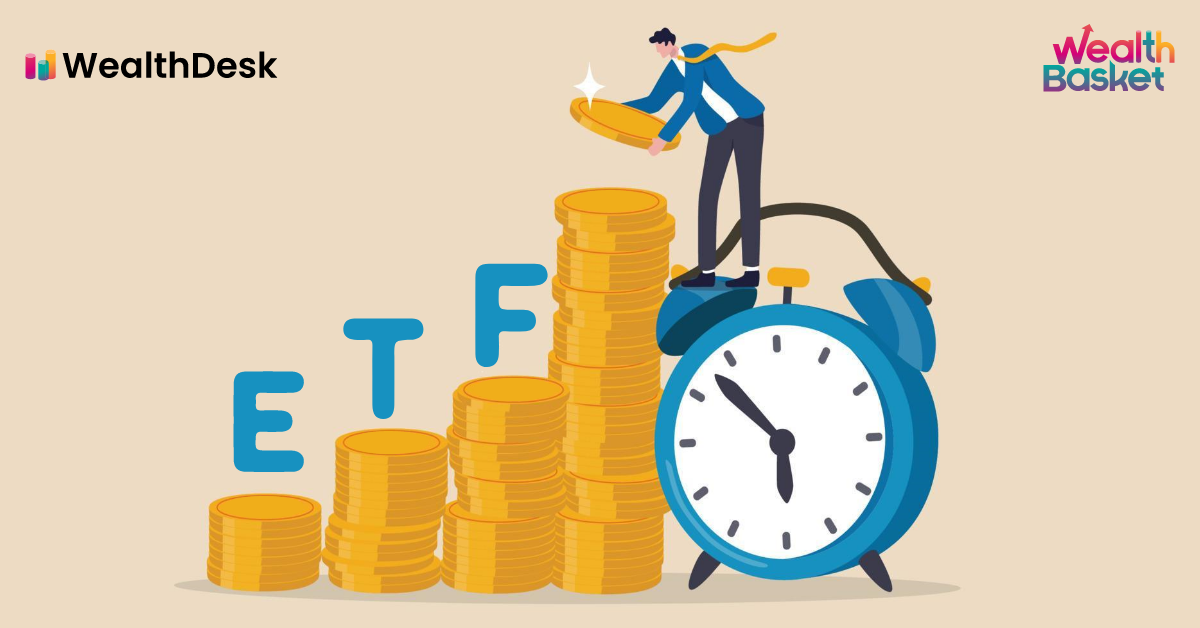An ETF is a basket of securities that tracks an underlying asset. ETFs invest in shares of the companies and fixed income securities including bonds, gold, and other securities. These securities are called the holding of the ETFs.
Since stock market ETFs are a relatively new form of investment in India, many investors have questions like “how to invest in ETFs?” and “are ETFs traded on exchanges?”.
ETF investments are pretty simple as the name ‘exchange-traded funds’ suggests ETFs trade on stock exchanges. Investors can trade the units of their ETFs on the stock exchanges throughout the day. ETFs also provide enough liquidity to the investors, thereby reducing liquidity risk.
Different types of ETFs in India
ETFs in India include Equity ETFs, Fixed Income ETFs, Index ETFs, Commodities ETFs, Real Estate and Infrastructure ETFs, etc. While equity ETFs are funds that invest in the common stock of various companies, index funds invest in stocks that constitute part of a particular index (Nifty, Sensex, etc.).
Bond ETFs invest in fixed-income securities, whereas commodity ETFs invest mainly in precious metals and natural resources. REITs & InvITs invest in revenue-generating real estate and infrastructure projects, respectively.
Advantages of ETF investments
ETFs provide a one-stop investment solution for investors wanting to diversify their portfolios at a lower cost and through ease and convenience. There are numerous advantages of ETF investments for investors. Some ETF advantages are listed below:
- ETFs are Operationally Convenient
Stock market ETFs provide exposure to multiple securities through single trade execution. Thus, ETFs provide operational advantages to investors. However, direct investment in stocks entails executing multiple trades to gain exposure in various securities, which becomes cumbersome for the investors.
- ETF investments are easy to trade
ETFs trade like common shares on the stock exchanges. The ETF prices are updated continuously throughout the day. Investors get a hassle-free trading experience in ETFs.
- ETFs provides Diversification
Since ETFs invest in multiple securities, it provides diversification to the investors. Investments in a particular stock expose the investor to concentration risk. ETFs diversify the portfolio to include various securities.
- ETFs Reduces Risk
Best ETFs in India provide adequate diversification in the portfolio; thereby, investing in ETFs reduces the risk for the investors. Holding individual security may be risky because any downward movement in the stock price leads to losses for the investor. On the contrary, ETFs are well diversified to prevent any volatility in single security from affecting the entire portfolio.
- ETFs Reduces Cost
One of the vital ETF advantages is that ETF investments reduce costs for the investors. ETFs do charge some amount as fees for managing the funds. However, those are generally lower in comparison to other actively managed funds. Cost reduction is one of the significant advantages of exchange-traded funds over Mutual Funds.
- ETFs provide Investment Avenues
REITs and InvITs provide investors exposure to real estate assets and infrastructure assets. For retail investors, owning property or an infrastructure project is costly due to hefty investments. In such a scenario, REIT and InvIT expose the investors according to their risk & investment appetite.
Advantages of ETFs over Mutual Funds
Broadly, ETFs and mutual funds are similar because they pool money from the investors and invest in various securities. ETFs and mutual funds diversify and thereby aim to reduce risk. However, ETFs have some advantages over mutual funds. Some of the ETF advantages are listed below.
- Minimum Investment Amount
Some mutual funds have a minimum investment amount. On the other hand, ETFs do not have any minimum investment amount. Therefore, an investor can purchase ETFs just like a share at the prevailing market prices.
- Trading of ETFs
ETFs trade over the stock exchanges during the trading hours of the day. Any investment or redemption from a mutual fund is executed on closing NAV at the day end. Thus, the live trading is not possible.
- Arbitrage Opportunities
ETFs provide arbitrage opportunities since ETFs and their underlying securities trade throughout the day on the stock exchanges. Mutual Funds consider closing NAV, thereby eliminating any arbitrage opportunities.
- Cost Advantages
Most of the ETFs are passive funds. Thus, the management fees are comparatively lower than mutual funds, which trade actively. Mutual funds also incur costs related to marketing which the ETFs usually do not incur.
- Market reach of ETFs vs Mutual Funds
ETFs are traded on the exchange, giving them a better geographical reach than mutual funds. Active marketing is required to increase the reach of mutual funds.
Mutual Funds vs ETFs
| Mutual Funds | ETFs |
| Traded after market hours | Traded during market hours |
| Purchase and sale at Net Asset Value | Purchase and sale at Market Price |
| Can be actively managed or passively managed | ETFs are mostly passively managed |
| Automated transactions can be set up | Automated transactions cannot be set up |
| No arbitrage opportunity | Arbitrage opportunities are present |
| The minimum investment amount is present | No minimum investment amount |
Best ETFs in India
ETF investments deliver varying returns under different time buckets. Some outperform in the shorter period (one week, one month, or one year), while others outperform in the long run (more than one year period). Thus, an investor needs to choose from the best ETFs in India, considering his investment horizon and accompanying risk factors.
A couple of essential factors in selecting the best ETF to invest in are determining the ETFs’ AUM and past five years’ return data.
It is recommended to look at the performance for a longer tenure (5 years and above) because looking at short term data can be misleading as it can be affected by one time events such as Covid-19.
Few of the index-based best ETFs in India based on past returns and AUM greater than 100 Cr are listed below:
| Name of the Fund | Asset Size(In crores) | Past 05 years Returns |
| HDFC Index Fund – Sensex | 2323.93 | 16.01% |
| Nippon India Index Fund – Sensex | 166.48 | 15.99% |
| IDFC Nifty Fund | 326.26 | 15.36% |
| UTI Nifty Index Fund | 4353.12 | 15.30% |
| HDFC Index Fund – Nifty 50 | 3415.32 | 15.23% |
Conclusion
Though the fund size & past performance does not guarantee future returns, it provides comfort due to substantial investor participation and established past precedence. Get in touch with an expert to know more about ETFs and how you can benefit from buying them.
At WealthDesk, experienced advisors analyze the best ETFs in India and. It also allows investors to make informed decisions about different ETFs and shares based on their targeted risk and return considerations.
With WealthBaskets, investors can invest in baskets of premium ETFs and stocks, curated by experienced advisors. Investors can invest in WealthBaskets based on a theme, sector or idea that they prefer.
FAQs
Equity ETFs trade on the stock exchanges throughout the day. The price keeps on changing during the trading session, generally in line with the fair value of the ETF assets. Investors can trade their ETFs through the Demat accounts with their brokers.
ETFs vs Stocks: Equity ETFs provide different
risk-reward opportunities to the investors compared
to individual stocks.
An investor can consider ETF investments as an
alternative to stock investments. However, ETF
investment is generally a safer option. Individual
stocks investments may go down. But in the case of
ETFs, the overall portfolio may not lose much value
due to investments in multiple securities.
ETF investments are different from Mutual Fund investments. ETFs are passive funds, whereas mutual funds are generally actively managed. Due to this reason, ETFs cost less than mutual funds to an investor. Also, ETFs trade throughout the day, but the settlement of mutual fund units occurs at the end of the trading session.
Exchange-Traded Funds (ETFs) are useful for investors trying to diversify their portfolios at a low cost. It is difficult to say whether ETFs are best in general, however, they have certain advantages over stocks and mutual funds.


















